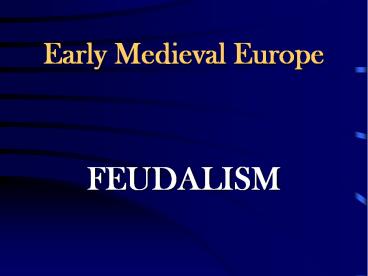Early Medieval Europe - PowerPoint PPT Presentation
1 / 23
Title: Early Medieval Europe
1
Early Medieval Europe
- FEUDALISM
2
(No Transcript)
3
Following the death of Charlemagne, central
government again weakened and disappeared in
Europe. His successors were unable to provide
protection for the people against outside
invasion. Trade and communication declined once
again. Local communities were forced to become
self-sufficient and sought ways to protect
themselves. The result was a new political,
social, and economic system which provided for
the needs of local people. This system became
known as Feudalism. By the mid 1000s feudalism
had become a way of life throughout Western
Europe.
4
Origins of Feudalism
- Feudalism began in France in the late 800s
following the death of Charlemagne - Feudalism arose primarily as a means of
protection against invaders, especially the
Vikings - Feudalism spread throughout Europe over the next
two centuries
5
What is Feudalism?
- A political system of local government and
military defense - A social system of distinct class based on land
holding - An economic system of self-sufficient manors
6
Feudalism as a Political System
- Fiefs - Large tracts of land granted to vassals
in return for service and loyalty - Vassals - People who were given fiefs in return
for service and loyalty - Lords - Nobles who owned large tracts of land
called fiefs to vassals in return for service and
loyalty
7
(No Transcript)
8
FEUDAL SOCIETY
King Powerful Lords Lesser Lords
UPPER
Knights
MIDDLE
Clergy
LOWER
Serfs and Peasants
9
(No Transcript)
10
Feudal Society
Upper Class
- King - Owned all land
- Nobles - Vassals of kings called Lords who
controlled large tracts of land - Knights - Lowest and most numerous group of nobles
Middle Class
Clergy - Priests, monks, nuns
Lower Class
Serfs Peasants- Working poor who worked lived
and worked on the land of lords. Serfs were bound
to land through oath of loyalty to a lord.
Usually uneducated. Served several days a year
in the lords army.
11
Feudalism as an Economic System
The most important aspect of the feudal system
was the large estate called a manor. The manor
acted as a self-sufficient economic unit and
generally ranged from 500 to 5000 acres. The
economic system of feudalism is therefore known
as Manoralism
12
Feudalism as an Economic System
A typical manor consisted of the following
- Farm and Pasture Land
- The Lords land - best of the land. Usually 1/3
of the manor - Serfs land - Spread throughout the manor.
Usually poor in fertility - The Lords Castle
- Center of political and military activity.
- Provided protection during attack
- The Village
- Contained serfs huts, artisans shops, and the
lord wine press, flour mill, and baking ovens.
Villagers paid the lord to use the facilities.
13
(No Transcript)
14
Medieval Manor
15
(No Transcript)
16
Knighthood
- The lowest level of nobility was the knight.
Generally, the sons of nobles would be trained as
knights beginning at an early age. Eventually,
the knight might become a lord after inheriting
the wealth and land of his father. Others could
become knights too. There were two types of
knights
17
- Knights of the Bath
Sons of nobles trained to become knights. They
were trained in three stages
- Page
- At age 7, the young boy was sent to the castle of
a lord where he waited on his host and learned
manners. - He spent leisure time hunting and playing war
games with other pages
18
Squire
- Around age 14, the page would be promoted to a
squire. - He was assigned to a knight and would help him
with weapons and armor. - He traveled with the knight into battle and
practiced his skills.
19
Knight
- At age 21, the squire became a full fledged
knight. - He first took an elaborate bath to wash away the
impurities of body and soul. - He spent a day fasting and a night praying.
- The lord dubbed him a knight by tapping him on
the shoulder with a sword.
20
Knights of the Field
- A young man could occasionally become a knight
by showing valor on the battlefield. - He could be knighted by a lord without going
through formal training
21
The Code of Chivalry
Late in the period of feudalism, a code of
conduct developed that would change feudal life.
This code, called the Code of Chivalry stressed
1. Loyalty to God and the knights lord 2.
Protection of the oppressed and poor 3. Courage,
courtesy, and generosity 4. Support of justice 5.
Defense of Christianity
22
Decline of Feudalism
Feudalism began to gradually disappear in the
late 1100s. Disease, ignorance, poverty, and
superstition dominated the feudal era and
contributed to its demise. However, the two main
reasons for the decline were the Crusades and the
Rise of Nation States.
The Crusades (1095-1291) Four major religious
wars in which Europeans attempted to reclaim the
Holy Land from the Muslims. Europeans were
introduced to eastern ideas and goods. As the
demand for eastern goods increased, feudal
economies began to weaken.
The Rise of Nation States
Between the 14th and 17th centuries, nation
states developed powerful governments headed by
absolute monarchs. Feudal governments weakened
as a result.
23
Decline of Feudalism
The longbow weakened the power of knights and led
to a decline in feudalism.
24
(No Transcript)































